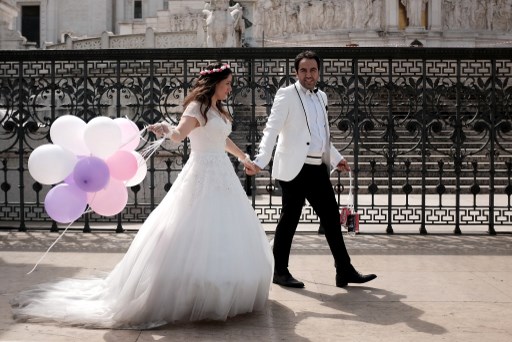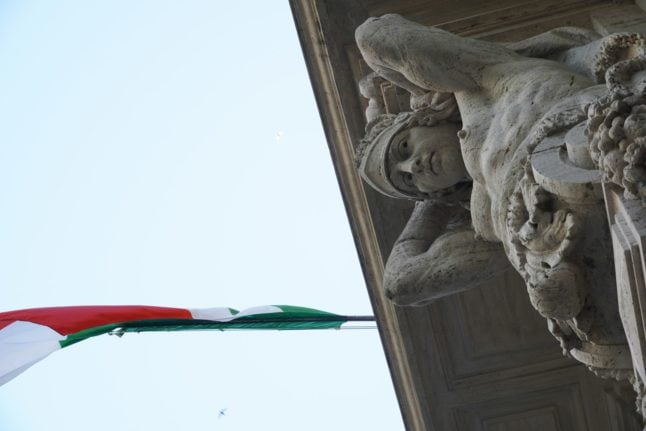“You’d better hurry up and find an Italian to marry, or you’ll end up getting kicked out after Brexit!”
If you're a British citizen living in Italy, chances are someone you know has made this kind of comment before.
Many people imagine that marrying an Italian means you’ll automatically be handed an Italian passport and thus avoid the upheaval and stress that will come with Britain leaving the EU – if and when that happens
READ ALSO: The ultimate no-deal Brexit checklist for Brits in Italy
The threat of potentially having to return to the wet and windy UK means even the least marriage-minded of us may be tempted to broach the topic with our Italian partners, or consider taking that amorous waiter up on his latest offer.
But, while there are plenty of good reasons to marry an Italian, sadly we’re here to tell you it’s no guarantee of Italian citizenship and peace after Brexit.
As anyone who has already married an Italian (for non-Brexit-related reasons, of course) is well aware, we sadly don’t get handed Italian citizenship immediately after exchanging vows, but must wrestle with much the same bureaucracy as everyone else.

Unfortunately, Italy won't give you one of these as a wedding present. Photo: Depositphotos
You will still have to wait two years after exchanging your vows at the local comune to be eligible for Italian citizenship, and even then, there’s no guarantee you’ll get it.
Marriage does allow a non-Italian spouse to apply for a long-term residency permit (permesso di soggiorno) which would mean they could stay in Italy.
However, having this would not solve all the Brexit-related problems of Brits used to having the rights that come with EU citizenship.
British citizens with residency permits are still expected to face more bureaucracy after a no-deal Brexit – to say nothing of the stress and other issues caused by uncertainty about their rights.
Needless to say, the only way to fully escape this would be to have citizenship of another EU country.
However, it’s not all bad news: the long road to getting Italian citizenship is made a little bit shorter by marriage
What does citizenship involve?
Citizenship gives you a lot more rights than residency, including the right to vote, and is consequently harder to obtain.
It was made harder still earlier this year when Matteo Salvini’s “anti-migrant” bill became law, doubling the wait time for applications to be processed and requiring that applicants now pass a language test.
There are broadly three ways to get citizenship: through residency, through marriage, or through having Italian ancestry. Eligibility criteria vary depending on the route.
And marriage won’t mean your Italian spouse gets British citizenship, either. To do so, they’d need to live in the UK with you for three years before applying and following the British citizenship application process.
How does being married help?
The first thing to know is that you can’t apply for citizenship right after the wedding.
The spouse of an Italian can apply for citizenship two years after the marriage if the couple lives in Italy, or three years if they live abroad, and the terms are reduced by half if they have children.
You’ll then wait up to four years – increased from the previous two years by the recently-passed laws – for your application to be processed, with your fingers firmly crossed.
In the past, applications from spouses were pretty much guaranteed to be accepted. But now, they can be rejected by authorities for any reason.
So how long would it take?
Altogether, the process of obtaining citizenship after marriage will now probably take around 5-7 years, depending on your circumstances.
This is quite a bit shorter than the possible total of ten years now faced by EU nationals applying for citizenship via the long-term residency route, or longer for non-EU nationals using the same route (again the time it takes can vary greatly depending on your circumstances.)
But if you were hoping a quickie marriage to your local barista might solve all your Brexit problems, unfortunately it won't.
Read more on the requirements for citizenship applications here.
What about citizenship of another country?
If you are married to a citizen of another EU country you can apply for citizenship there and then, as an EU national, you will have the right to stay in Italy. Different countries all have their own rules for citizenship. Check out each country's requirements here.
So although being married to an Italian does help, it won't solve all of your residency problems. But least you'll have someone who is contractually obliged to listen to you complain about Italian bureaucracy.
READ ALSO:



 Please whitelist us to continue reading.
Please whitelist us to continue reading.
Member comments